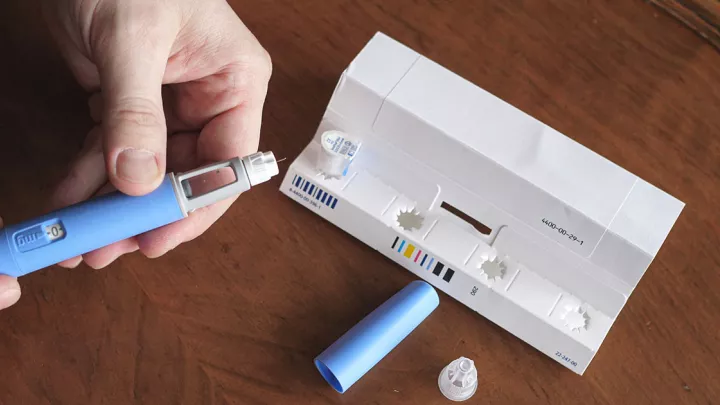Is weight loss always a matter of calories in, calories out?

The popularity of diabetes injection medications like Ozempic® and Mounjaro™ has revived the debate over what causes weight loss. Is it simply a matter of calories in, calories out? Many claim to have difficulty losing weight despite following strict dieting and exercise routines. But when they started taking these medications, the weight began falling off.
What does it really take to lose weight? Is it just a matter of taking in fewer calories than your body uses in a day? Or are there other factors at play?
“When it comes to weight loss, calories in, calories out is an oversimplification,” says Brianna Johnson-Rabbett, MD, Nebraska Medicine endocrinologist, diabetes and metabolism specialist. “We generally need to take in fewer calories than our bodies use to lose weight. However, many factors contribute to weight loss, including brain biology and environment.”
How many calories should I aim for if I want to lose weight?
One problem with counting calories is that figuring out and achieving the calorie deficit you need to lose weight can be difficult. Also, most people will accidentally undercount the calories they consume, which can make things even more difficult.
Individual calorie recommendations depend on many factors, including age, height, gender, exercise level, weight goals and overall health. The average adult who wants to lose weight should aim for approximately 500 fewer calories daily. You can do this by tracking your calories in a food journal. You can also use a calorie-tracking app like LoseIt! or MyFitnessPal.
“Most of our nutrition comes from nonstarchy veggies and lean protein. These foods are also usually less calorie dense,” says Dr. Johnson-Rabbett. “It is very easy to get too many calories from “snack” food and simple carbohydrates that don’t have nutritional value”
Also, while exercise isn’t required to lose weight, it is important for general health and maintaining muscle mass while losing weight.
Does menopause make it harder to lose weight?
There is an association between menopause and weight gain, though individual experiences vary significantly.
“We don’t have good evidence that menopausal hormonal changes directly cause weight gain,” explains Dr. Johnson-Rabbett. “However, changes in estrogen typically cause women to accumulate more fat in the abdominal area. One of the main factors behind menopausal weight gain appears to be moving less and therefore burning fewer calories.”
There are several ways to lose weight during menopause, but hormone replacement therapy is not one of them. HRT can help relieve some symptoms of menopause, but it is not a weight-loss treatment. Reduce your daily calorie intake, to lose weight. Most women can aim for 1,200 to 1,500 calories per day. Exercise regularly. And, ask your doctor about anti-obesity medications if dietary and exercise changes alone are not enough to reach healthy weight goals.
Can I lose weight if I have PCOS?
Polycystic ovary syndrome, or PCOS, is a condition in which the ovaries produce an abnormal amount of androgens. Androgens are male sex hormones usually present in women in small amounts.
Many women with PCOS have insulin resistance. Insulin resistance means a less-than-expected decrease in blood sugar in response to insulin. (This includes insulin produced by our body, as well as insulin given as a medication.)
Obesity can also increase insulin levels and make PCOS symptoms worse. PCOS itself doesn’t cause rapid weight gain. However, some feel that the insulin resistance associated with PCOS can make it more difficult to lose weight.
Recommendations for weight loss with insulin resistance are similar to anyone trying to lose weight. Women with PCOS should decrease their caloric intake, exercise and use antiobesity medications if recommended by their health care provider.
Looking for help on your weight-loss journey?
The best nutrition plan is one you can maintain. If calorie counting isn't for you, other strategies may be more helpful. A health care provider or registered dietitian can help you identify a weight-loss and diet plan that's right for you and your health goals.
Looking for assistance in achieving your weight loss goals? Call our Bariatrics Center at 402.559.9500 to get started.







